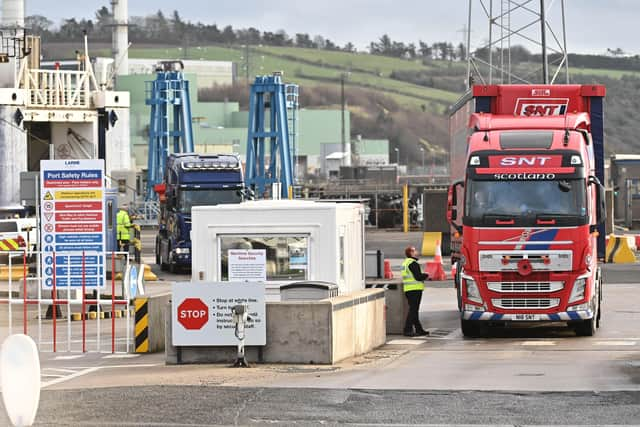Lord Jay, peer who chairs House of Lords Committee on the Northern Ireland Protocol, accepts that it is causing instability
and live on Freeview channel 276
Lord Jay also called on the UK and EU to resume negotiations now to reach a compromise over the contentious deal with Brussels.
He implored London and Brussels to “rebuild trust” and get around the talks table to reach a new deal on the protocol.
Advertisement
Hide AdAdvertisement
Hide AdSpeaking after the launch of his committee’s report on the protocol this week, Lord Jay told the News Letter: “We certainly accept that it is causing economic instability in the sense that traders who want to trade from Great Britain to Northern Ireland are finding it difficult to do so given the way the present arrangements are being implemented.


“We also recognise that trade from north to south is benefiting so there is economic instability in that there is what some would call ‘trade diversion’, or what others might call an ‘advantage’ in terms of jobs. But there is economic instability and I would accept that it has also led to political instability and that needs to be resolved.”
Lord Jay acknowledged that every unionist party opposes the protocol adding: “The protocol at the very least has to be substantially changed and that is an obligation on both sides.”
He declined to say if he expected members of the Lords to amend or dilute the Protocol Bill when it arrives in the upper house in Parliament in early September.
Advertisement
Hide AdAdvertisement
Hide AdThe legislation, which is supported by the DUP, will give the UK government the power to change those aspects of the protocol which unionists say threaten Northern Ireland’s place in the Union.
Lord Jay said: “What we will do on the committee is when we come back in September we will be looking at the legislation and will listen to witnesses, and aim to produce a report for the House of Lords ahead of second reading of the bill, which we expect will be some time this autumn possibly even October.
“What I can say is that I think the question of whether the bill is an infringement of international law is going to be one of the big questions to be addressed.”
On a resumption of UK-EU negotiations, Lord Jay said: “It is key to repair the damaged relationship between both sides. You cannot have an agreement, as at some stage we are going to have one, without negotiations, and to get those going again you need to have trust on both sides.
Advertisement
Hide AdAdvertisement
Hide Ad“If and when negotiations start they are going to be very tough but as we stress in our report, businesses in Northern Ireland, the people of Northern Ireland, their interests do depend on an agreement.
“This was clear from the evidence that we received in Northern Ireland.
“So, somehow or other we need to find a way of getting negotiations going again. And that is going to mean flexibility and movement on both sides. That means there is some movement from the UK and some from the EU.”
One of the report’s core suggestions is that the ‘grace period’ preventing full, rigorous implementation of EU border checks at NI ports should be made permanent.